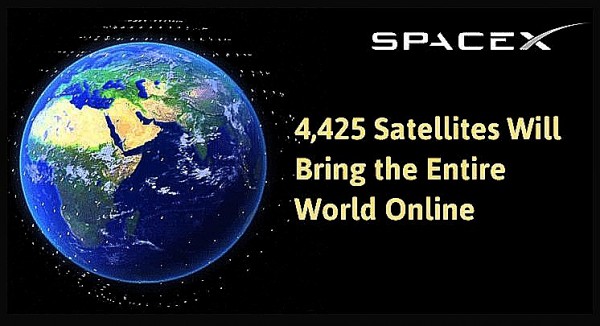By Arthur Dominic J. Villasanta , | May 05, 2017

4,425 satellites.
Elon Musk intends to launch his fantastic plan of providing high-speed internet anywhere on Earth by launching the first of a massive constellation of 4,425 super-fast internet satellites in low Earth orbit (LEO) by 2019.
If Musk can pull-off this fantastic feat, it will make him the world's largest satellite operator and the "God" of the internet. Musk said SpaceX will launch a prototype of his satellite by year end.
Like Us on Facebook
In November 2016, SpaceX detailed its ultra ambitious plans to orbit 4,425 satellites in a filing with the U.S. Federal Communications Commission (FCC).
A few days ago, SpaceX vice president of satellite government affairs Patricia Cooper said the company will start testing the satellites themselves later this year. SpaceX will orbit a prototype before the end of the year and another during the "early months" of 2018.
If successful, these tests will herald the start of SpaceX's satellite launch campaign in 2019.
The 4,425 satellites will operate in 83 orbital planes in LEO ranging from 1,110 km to 1,325 km.
"The remaining satellites in the constellation will be launched in phases through 2024," said Cooper on May 3 before the Senate's Committee on Commerce, Science and Technology.
In its FCC proposal, SpaceX said its system "is designed to provide a wide range of broadband and communications services for residential, commercial, institutional, governmental and professional users worldwide."
This unheard of number of satellites under the control of a single company will create a "mesh" of connected satellites. This means data can travel faster around the world and could one day lead to gigabit speeds in homes everywhere.
This extraordinary undertaking will be made possible by the success of SpaceX in re-using the first-stage booster of its Falcon 9 launch vehicles. The reusability of its boosters means SpaceX's launch costs will become much lower than they are now.
It currently costs about $60 million to orbit a satellite using the Falcon 9.
"SpaceX intends to launch the system onboard our Falcon 9 rocket, leveraging significant launch cost savings afforded by the first stage reusability now demonstrated with the vehicle," said Cooper.
Cooper said the SpaceX high-speed internet satellites will provide additional broadband capacity to the SpaceX system "and further reduce latency where populations are heavily concentrated."
SpaceX will also build infrastructure required on the ground to "allocate broadband resources in real time, placing capacity where it is most needed and directing energy away from areas where it might cause interference to other systems, either in space or on the ground."
-
Use of Coronavirus Pandemic Drones Raises Privacy Concerns: Drones Spread Fear, Local Officials Say

-
Coronavirus Hampers The Delivery Of Lockheed Martin F-35 Stealth Fighters For 2020

-
Instagram Speeds Up Plans to Add Account Memorialization Feature Due to COVID-19 Deaths

-
NASA: Perseverance Plans to Bring 'Mars Rock' to Earth in 2031

-
600 Dead And 3,000 In The Hospital as Iranians Believed Drinking High-Concentrations of Alcohol Can Cure The Coronavirus

-
600 Dead And 3,000 In The Hospital as Iranians Believed Drinking High-Concentrations of Alcohol Can Cure The Coronavirus

-
COVID-19: Doctors, Nurses Use Virtual Reality to Learn New Skills in Treating Coronavirus Patients











